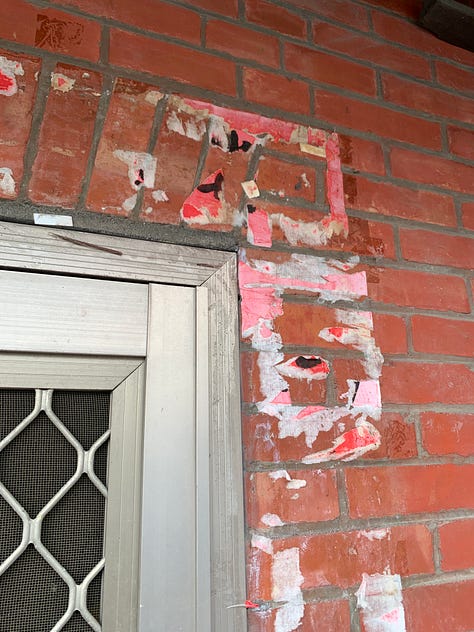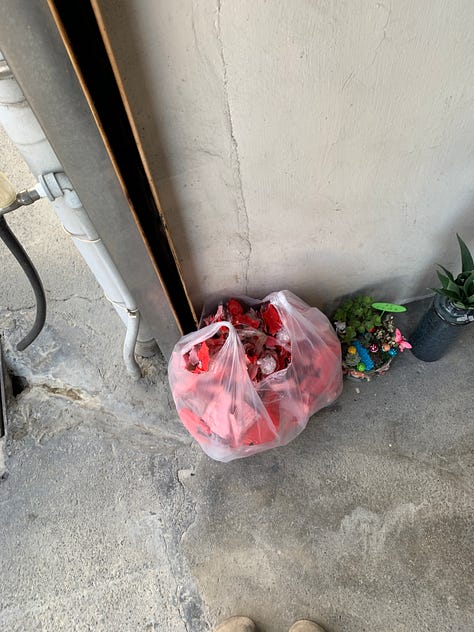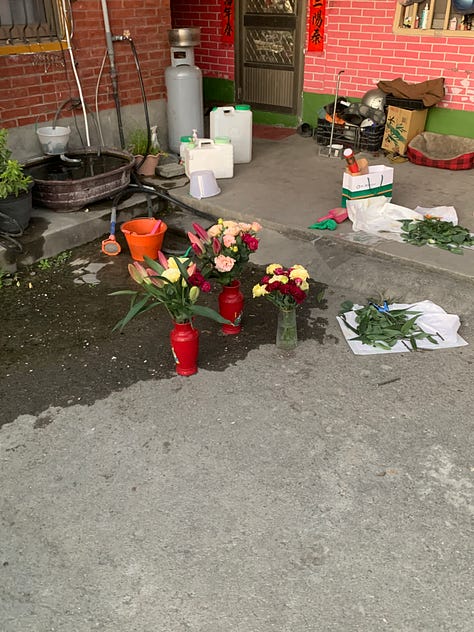Somehow along my travels in Taiwan, I’ve found myself back at a pottery studio. For two months I’ll spend my time here, messing around again with clay.
A pottery studio, it seems, has distinct roles for teacher and student. I find that when asked who taught me, I often nod when asked if I taught myself. Though this is not entirely untrue, neither is the fact that I’ve had a number of teachers who have helped me along the way. It’s so difficult to answer this question that seems to demand a single answer, a single person, when every teacher I’ve ever had would be the correct one.
Who taught you?
I say self taught because hundreds of hours spent throwing alone have taught me, but the truth is I’ve had a number of teachers. Teachers who have encouraged me to spend these hours alone and stood by when I come running with little questions. If I had more time to answer this question I would say every teacher in every subject, in every field, at every age, has taught me. From pottery studios to kitchens to farms to riding a bike and changing a spare and learning to read and write, I use lessons from my teachers in everything I do. I try drafting a new answer every time, because every time I answer with self taught I am telling a blatant lie.
Who taught you?
How long do have?
I have had a myriad of great teachers.
The greatest teachers use a kind voice—not a quiet one, because years of teaching have roughened their vocal chords so they now speak with confidence and clarity; behind every word lies a command and purpose, but behind their gravely, hoarse, frog croak of a voice is a rhythm that bespeaks kindness. The greatest teachers guide with gentle hands—not soft ones—because years of practice has left calluses in odd joints, but after years of practice they know how to use their rough hands delicately.
The greatest teachers don’t punish you for failing. They know you know less, and they do not slap you on the hands with sticks for it. They would rather you callus those hands yourself, through practice rather than through flame. They must know that a hand only grows heavier when holding calluses given by another.
The greatest teachers are patient. So patient you reconsider religion, because only some higher being could explain this level of patience, right? When it’s been the tenth week in a row that you “forgot” to practice and they manage not to shoot themself in the head within that hour, you think they could launch quite a successful career selling courses on ‘how to achieve such spiritual enlightenment’ or whatever meditation it is that they must do in their free time. A simpler explanation may be that they chose to be a teacher; that they love it. The cynic in you says it’s for their paycheck.
However, when years have passed since your final lesson with your teacher, when your fingers have no longer moved in such a way that rust has formed around joints which once danced freely across ivory ballrooms—after years of silence on your end—your teacher reappears. Out of nowhere, a simple message appears on your phone that makes you wonder how long they’ve been watching you from afar.
And then you really begin to wonder. Wonder things like what kind of mental gymnastics they must have been doing on the other side all those years to keep from exploding at you. Wonder what they saw in you to send this message, even when you showed up week after week at their doorstep with nothing to show for but the same excuse. Perhaps beneath a stoic facade, their blood vessels were rapidly approaching hypertension: a condition commonly caused by students like you. You consider apologizing for the many years you may have shaved off their life, but now you are questioning whether high blood pressure is really just a mindset or not.
The greatest teachers catch you when you fall. Not on the track when you are running down the runway with a stick in your hand. That’s what the mat is supposed to do. They catch you when you really fall. When you’ve made a mistake; a mistake they did not see but hear about from a colleague. They catch you in what way they can, and only later do you find out they have saved you, if just a sliver, from something a little worse. When you see your mother collapse to her knees, you realize your teacher has saved you from having to watch her sink directly into the cement and disappear. They save you because they are your teacher and you are their student. Like a newborn baby, you showed up at their doorstep and they shaped you, like clay, giving you legs to walk and wings to fly. They catch you because they have seen you fall before, and this is just another fall—if just a little harder—that they will see you get up from. In a place you no longer feel any desire to return to, you might go back someday to buy a coffee and a donut for that teacher.
The greatest teachers meet you at a fork in a road. As you walk together, you swap wisdom from your respective great teachers. They lend you their eyes, to see the world as they might. And you wish to lend them your eyes too, but by optometry standards you are legally blind so you can only lend them your glasses—still a terrible idea—so instead you lend your palate. They show you the world through their eyes, a world you would continue to be ignorant of if you chose not to look at—a privilege given to you by birth as a man. They coax your voice from you, and teach you to sing with it, with words on paper. You write now because a part of them lives in every word you lay down, and you wish for your teacher to be immortal. Though your voices are different now from when you met at that fork in the road, they only sing together in greater harmony.
The greatest teachers do not teach at all. The greatest teachers have spent a lifetime teaching and are comfortable leaving you alone in a room while they enjoy their retirement. Except it’s not just some old room, it’s their old room. Their room, full of all their things and trinkets and gifts and little notes and old event posters and equipment and even… blowtorches? At the sight of such things you wonder if this heuristic approach is really just a test, and that behind that eerily large frame of your teacher and their friend posing for a picture is a hidden camera; which at any second may pop out and a voice on a loudspeaker will castigate you for defacing your teacher’s precious studio with that blowtorch you weren’t meant to touch. But for some reason the loudspeaker remains silent, so maybe you are a little delusion. You wonder if all teachers are so well practiced in the art of letting go. How they are so exercised in the emotional detachment of their years long accumulation of prized possessions that they trust some random kid with blowtorches in their room.
The greatest of teachers sits across from you. In some ways they know less than you, much less; in some ways they know much more. They ask questions you have skipped over on your way to becoming their teacher, questions you have not yet thought to answer, questions you will learn the answer to for them. They point out the calluses and burns and bruises on your hands and arms, they peel back your layers to figure out what you know and what you don’t and learn your mistakes which you have forgotten were mistakes. Your teacher does not just want your five ways of explaining something, they want a sixth and sometimes a seventh. You teacher lends you their youth and remind you what there is to love about teaching.
A great teacher makes it easier to spot a bad one—something there is no short supply of. It is tempting to stay under the umbrella of a great teacher, but a great teacher knows you were never meant to stay. They know you are only visiting. They will listen to your laments about the cold world outside and push you out the door with a warm smile. While it may seem cruel at the time, they know this is the best thing for you.
The greatest teachers know when to let you go.



It is my first time in Taiwan for the Lunar New Year. It is my first time taping up the couplets to welcome in the new year, and helping my grandmother carry food up to the altar.
In truth, my grandmother is a pretty good teacher. Except she guards her lessons with language that says otherwise. When I ask to learn something I often get the unnecessarily aggressive response:
“Aiya! You don’t know how to!”
I wish I knew Hokkien translation for ‘no shit.’
However, once you learn that this is preprogrammed response, a compulsion, you find out she more than willing to teach you. After I helped her set up food at the alter, she leaves ghost paper, money for ancestors, on the table for me to burn later. She tells me to come up in an hour and burn it all.
It’s quite easy to burn the ghost paper, I mean, not exactly rocket science. But like all things, with time comes some finesse. My mother has developed a bit of finesse when it comes to this. She smears the thick stack across her palm into a fan and claws at the top, folding a small stack of papers with each grasp. We burned papers together last year, though not for the new year. My sister and I clumsily tried to do the same as her, though only managing to each get through half of our own piles by the time my mom had burned four bands.
Standing there by myself a year later, I feared I was tainting the money because I am not a believer. There I was, a non believer sending offerings to his ancestors. I was not taught to be a believer, but I tried picturing it, my ancestors somewhere, impatiently watching, waiting for this kid to finish sending their paycheck. My ancestors, some whom I have never met. My ancestors, some whom I have not recollection of, but whom I felt the need to thank for having given me the gift of some of my greatest teachers. So while I burned the papers, in that moment between the fire, with the little flakes of gold paper falling to the ground, I tried my very hardest to believe.





Beautiful, deep, poetic. A special kind of wisdom seems to arise from your journey.... and it's touching. Thanks for sharing!